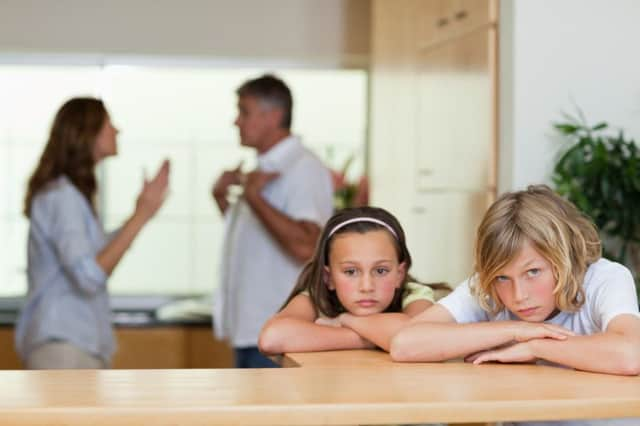Kids living with 1 divorced parent ‘fall ill more’


A study carried out in Sweden compared how children were affected by living with both parents, only one parent, mostly one parent, or by dividing their time between both in joint custody – and found that children in the latter category suffered from fewer psychosomatic problems than those living mostly or only with one parent.
Youngsters living with both parents in a nuclear family set-up had the lowest score of all on the “psychosomatic problems” scale, which also measured issues such as children’s concentration, difficulties with sleeping, dizziness and loss of appetite.
Advertisement
Hide AdAdvertisement
Hide AdThe proportion of children who said they “often” or “always” had the different symptoms assessed on the scale was highest among those who lived with just one parent.
Overall, girls reported more psychosomatic problems than boys.
The study authors said that joint custody has become more common in Sweden in recent years, rising from about one per cent to two per cent in the mid-1980s to up to 40 per cent of children with separated parents in 2010.
The researchers, who analysed 150,000 children aged 12 and 15 in Sweden, pointed out that several previous studies have established that youngsters with divorced or separated parents are more likely to suffer emotional problems and social maladjustment.
“The practice of joint physical custody – that is, children spending equal time in the respective homes of their separated parents – has become more frequent in Western countries over the past decade,” they said.
“At the same time, there has been an increase in self-reported paediatric psychosomatic symptoms.
“Child health experts have argued that joint physical custody imposes stress [compared to a nuclear family set-up].”
The study, led by the Centre for Health Equity Studies (Chess) at Stockholm University/Karolinska Institutet, is published in the Journal of Epidemiology & Community Health.
Advertisement
Hide AdAdvertisement
Hide AdDr Malin Bergstrom, of Chess, said: “Children living in joint custody arrangements had fewer psychosomatic problems than their peers living mostly or only with one parent, but they still had more than children living with both parents in a nuclear family. These findings held true even after taking account of influential factors, such as age and country of origin.
“And while the quality of the relationship they had with their parents, and their material well-being, were linked to the children’s psychosomatic health, it could not explain the differences found among children in the various different domestic set-ups.”
Dr Bergstrom said it was an observational study so no definitive conclusions can be drawn about cause and effect. However, the findings echo other studies.
The number of divorces in Scotland in 2012-13 was 9,700.